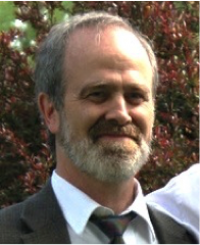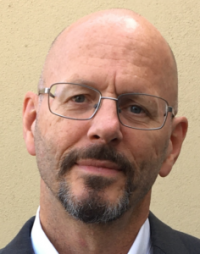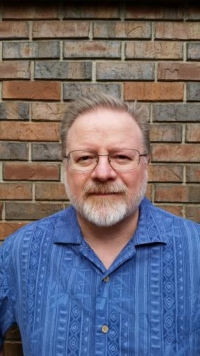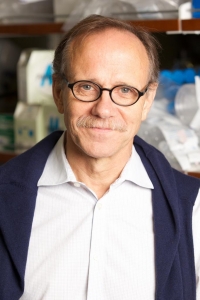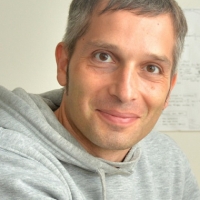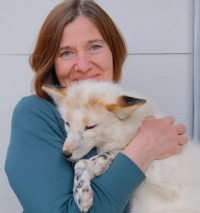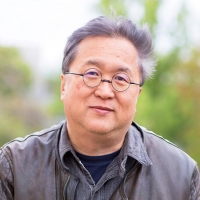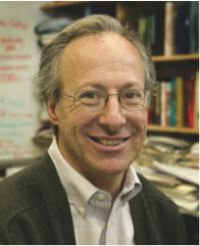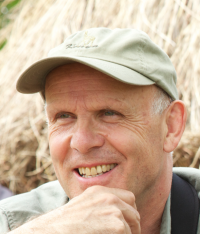Domestication and Human Evolution
Biographical Sketches: Co-Chairs
University of California, Berkeley
Terrence Deacon is chair of the Department of Anthropology at UC Berkeley and a researcher at the Helen Wills Neuroscience Institute. He received his PhD from Harvard University in 1984 and has served on the faculty of Harvard University, Harvard Medical School, Boston University, and UC Berkeley. He is a biological anthropologist known for research on human brain evolution, language function, cross-species fetal neural transplantation, and complex systems approaches to evolutionary theory. His 1997 book, The Symbolic Species: The Co-evolution of Language and the Brain (W. W. Norton & Company), was awarded the prestigious I. J. Staley Prize and his most recent book, Incomplete Nature: How Mind Emerged from Matter (W. W. Norton & Company), was published in 2012.
University of California, San Diego
Robert Kluender is a Professor of Linguistics at UC San Diego and serves on the CARTA Internal Advisory Board. He has been a member of CARTA since the mid-1990s, and has co-organized two CARTA symposia during that time: one on language evolution, and the other on domestication and human self-domestication. He also serves on the advisory board of the Center for Research in Language at UC San Diego. The underlying question addressed in his research is the extent to which the natural limitations of human cognition shape and constrain the human language system: how much of linguistic competence can be reduced to facts of performance, and how language is represented and processed in the brain. The Language and Brain Laboratory addresses these questions in experimental studies of language processing focused on the interaction of language structure, working memory, semantics and pragmatics, particularly as it unfolds in real time. Kluender also has long-standing interests in the origins of apparent linguistic constraints, the evolutionary foundations of language, and the intersection of language, consciousness, and the physical world.
Biographical Sketches: Speakers
University of Vienna
W. Tecumseh Fitch is trained as a biologist and cognitive scientist, and is an expert in acoustic communication in vertebrates.
He performs experimental work with species including humans, fish, birds, reptiles and mammals, and works in both the lab and the field. After a post-doc at MIT, Fitch taught at Harvard (US) and St Andrews (UK), before joining the Faculty of Life Sciences at the University of Vienna as a professor in June 2009. Fitch's research has two main strands: his work in bioacoustics has focused on understanding the mechanisms of vertebrate vocal production, and on using this understanding to generate realistic synthetic vocal stimuli for field and laboratory playback experiments. His work in biolinguistics and biomusicology has focused on the evolution of human speech, music and language, using the comparative approach to determine which mechanisms underlying these human faculties are shared with other species. From 2009 to 2014 this research was funded by an ERC Advanced Grant to study the perceptual and cognitive mechanisms underlying syntax and pattern perception.
University of Iowa
Robert Franciscus is a professor in the Department of Anthropology at the University of Iowa where he has conducted research on human evolution since 1998, having previously taught at Stanford University (1995-1997). Based on studies of fossil hominin remains throughout Europe, the Near East, and Africa, he has published widely on craniofacial and postcranial anatomy exploring biomechanical, climatic, and non-adaptive models for anatomical changes in later Pleistocene Homo, especially the Neanderthals, as well as the emergence of modern humans. He has recently broadened his methodological approaches to include collaborative experimental work in craniofacial growth, and a broader comparative evolutionary range extending to canids and potential parallel processes of self-domestication.
Salk Institute for Biological Studies
Fred H. Gage is a Professor in the Laboratory of Genetics and the past President (2018-2023) of the Salk Institute. He is an Adjunct Professor at UC San Diego, and emeritus Co-Director of CARTA. Dr. Gage concentrates on the adult central nervous system and unexpected plasticity and adaptability to environmental stimulation that remains throughout the life of all mammals. His work may lead to methods of replacing or enhancing brain and spinal cord tissues lost or damaged due to Neurodegenerative disease or trauma. Gage's lab showed that, contrary to accepted dogma, human beings are capable of growing new nerve cells throughout life. Small populations of immature nerve cells are found in the adult mammalian brain, a process called Neurogenesis. He is working to understand how these cells can be induced to become mature functioning nerve cells in the adult brain and spinal cord. They showed that environmental enrichment and physical exercise can enhance the growth of new brain cells and they are studying the underlying cellular and molecular mechanisms that may be harnessed to repair the aged and damaged brain and spinal cord. Gage is a member of the National Academy of Science and the Institute of Medicine.
The Skolkovo Institute of Science and Technology (Skoltech)
University of Illinois at Urbana-Champaign
Anna Kukekova is an associate professor in the Department of Animal Sciences at the University of Illinois at Urbana-Champaign. Dr. Kukekova graduated from St. Petersburg State University in Russia and obtained her PhD at the Institute of Cytology of the Russian Academy of Sciences. She then proceeded to a post-doctoral program at the Baker Institute for Animal Health at Cornell University where she was a research associate and subsequently a principal research scientist in the laboratory of Dr. Greg Acland. In 2002, she established a collaboration with Dr. Trut’s group at the Institute of Cytology and Genetics of the Russian Academy of Sciences to study the genetics of complex behaviors in the fox model of animal domestication. In 2012, Dr. Kukekova joined the Department of Animal Sciences at the University of Illinois at Urbana-Champaign.
University of Tokyo
Kazuo Okanoya is a professor of biopsychology and team leader of the Cognition and Behavior Joint Research Laboratory at The University of Tokyo. Dr. Okanoya was born in Japan in 1959 and studied animal psychology at Keio University, Japan. Okanoya obtained a PhD from the University of Maryland, USA in 1989, and in 1994, he became an associate professor at Chiba University, Japan, where he established a laboratory specializing in the study of animal communication. In 2004, Okanoya moved to the Riken Brain Science Institute and extended his area of research to include human language and emotion. In 2010, he moved to The University of Tokyo where he currently keeps his laboratory in biopsychology.
University of California, Los Angeles
Robert Wayne passed away on December 26, 2022 at the age of 66. He was a professor in the Department of Ecology and Evolutionary Biology at UCLA. Dr. Wayne long studied dog domestication beginning with his PhD work on morphology and development, which was followed by post-doctoral research at the National Cancer Institute with Steve O’Brien on the genetic analysis of domestic and wild canines. For the last 25 years, his studies ranged from ancient DNA, to complete genome analysis and gene expression. His focus was been on understanding the timing, place and context of dog evolution and how it was influenced by human society. He published over 250 works, on various aspects of evolutionary biology but with a focus on carnivores.
https://lifesciences.ucla.edu/in-memoriam-distinguished-professor-bob-wayne/
Harvard University
Richard Wrangham is the Ruth Moore Professor of Biological Anthropology at Harvard University, where he has taught since 1989. His major interests are chimpanzee and human evolutionary ecology, the evolutionary dynamics of violence, and ape conservation. He received his Ph.D. in Zoology from Cambridge University in 1975, was a Research Fellow at King’s College (Cambridge) from 1977 to 1980, and taught at the Department of Anthropology at the University of Michigan (Ann Arbor) from 1981-1989. Since 1987 he has studied wild chimpanzee behavior in Kibale National Park, Uganda. His most recent book is Catching Fire: How Cooking Made Us Human (Basic Books, 2009)
